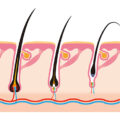Last updated on June 3, 2024
It is not uncommon for patients to lose some of their transplanted hair in the days and weeks immediately post hair transplant procedure. While this may be worrisome at first, there is no cause for alarm if you are following your post-operative care instructions. The hair will grow back in due time.
What is shedding?
Over 90% of the transplanted hair falls out after two weeks in a process called ‘shedding’, which is necessary for the follicle to regenerate and create new hair.
When the hairs are shed, there may be a crust at the base of each hair shaft and a small bulb at the bottom. Scabs falling off with hairs still attached does not mean that the follicle has been removed; The follicle remains in the same place beneath the scalp.
The scabs will begin to fall off in 5 to 7 days from the donor area and 7 to 10 days from the recipient area. This process can be accelerated by using Vitamin E oil or water-based moisturising cream, such as Aqueous cream, on the scabs overnight, starting on Day 3.
Great care should be taken post-surgery to minimise pain and eliminate the chances of infection.
Daily cleaning is necessary to get rid of scabs and promote healing. Be sure not to pick any hairs or scabs off your scalp, and follow your recommended scalp care routine.
The grafts take and survive during the first 5 days after hair transplant, but the patient should still be very careful about scratching the scalp or washing the recipient area.
The healthy hair follicles are firmly in place within 10 days after the procedure and they cannot be dislodged.
Please be assured that the shedding does not represent a lost graft, unless you see bleeding. If the whole of the follicle comes out (rarely if ever), it only means that the graft wasn’t adequately placed in the skin pocket.
Improperly placed follicles during implantation get desiccated and then fall leading to loss of precious grafts.
Shedding is a normal part of the transplant process and it is not a cause for concern.
Do not be alarmed if you initially see that your hair is thinner and lighter in colour. In about over a year, your hair will start to take on a much thicker and mature tone as it starts to fully grow.
Patients are also advised that shedding should not be confused with the less common condition, shock loss.
What is shock loss?
Shock loss of hair after a transplant – the sudden loss of hair from the recipient or donor area – can occur within 4 to 8 weeks after surgery.
In some cases, shock loss can occur even sooner.
We understand that shock loss, which occurs in a minority of patients, can be distressing for those affected by it and extreme care is taken to minimise the risk of experiencing shock loss.
However, if you happen to be amongst those affected by shock loss, be assured that this is only a temporary condition. This is a normal part of the healing process and your hair will grow back again.
Generally, shock loss is simply a natural response among a minority of the population to hair transplant surgery.
Women are more likely to experience shock loss, with an estimated 5% of female hair transplant patients affected.
Shock loss can be particularly noticeable if the transplanted hair has been placed amongst large areas of existing hair.
Is shock loss associated with any particular surgical technique?
Our professionals at New Hair Clinic are often asked if there is less incidence of shock loss with Follicular Unit Extraction (FUE) rather than Follicular Unit Transplantation (FUT).
There is no proven link between shock loss and any type of surgery.
Shock loss can occasionally occur around the stitches, but this too is temporary and the use of Hair-A-Gain (Minoxidil) will assist regrowth.
The application of Hair A-Gain (Minoxidil) after day three following a procedure will decrease the likelihood of shock loss as well as encourage faster regrowth of any shed hairs.
Be mindful though that bad techniques and inappropriate handling will maximise shock loss.
Hence, hair transplant surgery must be performed by a skilled and experienced physician.
If you would like more information on post-operative shedding or wish to speak to one of our hair loss professionals please call 08 9389 6000.








